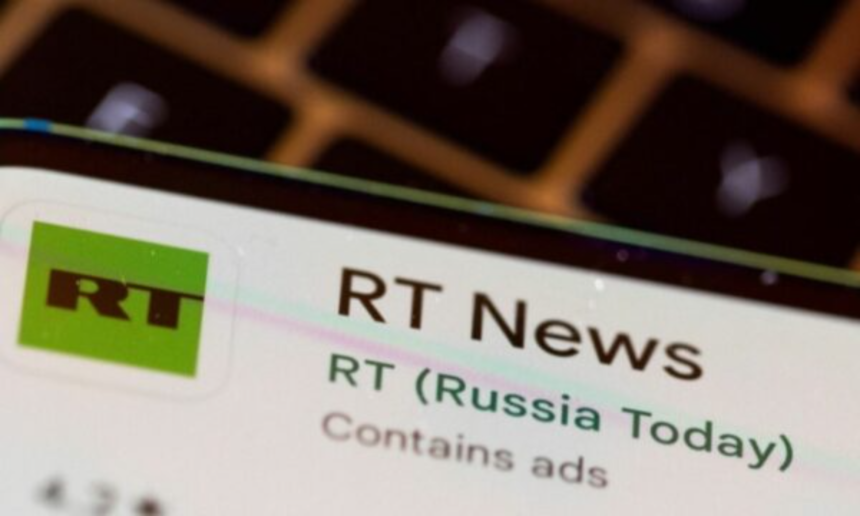A Russian television station is set to launch in Serbia soon, despite repeated demands from the European Union (EU) that Serbia impose sanctions and sever ties with Russia.
Margarita Simonyan, the editor-in-chief of Russia’s state-run media, which is known for spreading pro-Kremlin and Putin-friendly propaganda, recently announced that Russia will open a new television station in Serbia in the near future.
American analyst Ivana Stradner has called Serbia’s actions under President Aleksandar Vučić “completely unacceptable.”
“It’s unbelievable how Vučić and Putin are humiliating Washington and Brussels…” Stradner wrote on social media.
How Long Will Serbia Remain a ‘Fertile Ground’ for Russian Propaganda in the Balkans?
“Manipulation and media interference pose risks to democratic processes and social stability in Serbia and the Western Balkans. The State Department’s Global Engagement Center previously warned that Kremlin-run media outlets like RT and Sputnik are key elements in Russia’s disinformation and propaganda system,” said a response from the U.S. State Department regarding the functioning of Russian state-run media in Serbia, despite sanctions and bans placed on these outlets, which include their support for the aggression against Ukraine.
This issue was recently highlighted in a report by Reporters Without Borders, an NGO focused on protecting journalists and media freedom.
The report mentioned that RT (formerly Russia Today) uses its Belgrade bureau to tailor Kremlin narratives before disseminating them throughout Southeast Europe. This is made possible due to the Serbian authorities’ influence over the media and the favorable political environment in the country.
The U.S. State Department responded by emphasizing that it would continue working with Serbian partners to address the threats and covert activities of RT.
Last month, U.S. Secretary of State Antony Blinken announced that RT, as part of the ‘Russia Sevodnya’ network, which also includes RT Balkan, had gone beyond the role of a disinformation and propaganda outlet, engaging in covert destabilizing operations in the global information sphere. The U.S. imposed additional sanctions in response to Russia’s efforts to interfere in upcoming elections in Moldova and other malicious activities around the world linked to RT’s operations.
The U.S. also pointed out that in September, it had sanctioned Russian state-run media, including RT, which had been found collecting funds for the purchase of sniper rifles and other military equipment for Russian soldiers fighting in Ukraine.
U.S. and EU Sanctions Against Russian State Media
The European Union has also voiced concerns over Russian media operating in Serbia. EU spokesman Peter Stano stated that Serbia needs to take urgent action against Russian media manipulation and interference.
“The European Union has imposed sanctions on Russian state media, including RT, whose broadcasts have been suspended within and outside the EU. These outlets, including RT in all its formats, have become instruments of the Kremlin’s war against Ukraine and a channel for spreading manipulated information,” Stano told AFP.
Despite being a candidate for EU membership, Serbia has not banned RT and Sputnik broadcasts. In contrast, neighboring Montenegro banned these outlets in 2022.
In response to the EU’s requests, Arno Gujon, head of the Public Diplomacy and Cultural Office in the Serbian government, stated that Serbia will continue to promote media diversity and freedom of thought.
“The EU’s request is very troubling. It reminds one of the communist period during which censorship was applied in Yugoslavia under the guise of fighting against ‘harmful or undesirable ideas.’ It contradicts the values of pluralism, tolerance, and freedom of speech, which Serbs believe in, and for which many intellectuals fought, some of whom were imprisoned or killed,” Gujon wrote on social media.
RT Balkan has been operating in Serbia since 2022, publishing content online and on social media platforms. Although the station has been discussed, it has yet to begin broadcasting. Meanwhile, Sputnik Serbia launched in 2017 as part of the Russian news agency Sputnik, which is headquartered in Moscow and operates under the state media group “Russia Sevodnya.” It is a successor to the “RIA Novosti” agency and “Voice of Russia” radio.
Russian Influence in Serbia’s Media Landscape
Ruslan Trad, an expert at the Digital Forensics Research Lab at the Atlantic Council, explained to Voice of America that Russia is being provided with a platform in Belgrade to build serious infrastructure, which includes a media presence.
“The strong government influence in Serbia’s public life enables information operations to take place in a favorable environment. Pro-government Russian narratives are maintained through local media, with Russian propaganda outlets using Serbia to establish a broader presence in the region. They employ various methods, including advertising platforms on Google, where users are directed to content from RT or other Russian or pro-Russian media in Serbian,” said Trad, an expert on digital disinformation and human rights violations.
Trad believes that Serbian authorities will not take any action in response to EU or civil society criticisms.
“Belgrade’s position is clear. The EU, which has economic interests in Serbia tied to lithium, will hardly do more than issue statements and comments. President Vučić doesn’t see this as a problem, so things will continue as they are,” Trad said. According to him, any changes to this situation would depend on political decisions and the will to enforce the law.
“It’s clear that Belgrade allows this because of strategic interests, not because it is cornered. Unlike other countries in the region, Serbia sees the Russian Federation as an ally, but not as a partner at any cost. It’s no coincidence that Belgrade also has ties with China, the U.S., and European countries like France. However, if Serbia wants to be part of the European family, it will need to implement the rule of law and improve the media environment,” concluded Trad.
In May 2020, NATO’s Strategic Communications Center (STRATCOMCOE) published a study titled “Russian Footprints in the Western Balkans Information Environment” highlighting Russia’s unavoidable presence in the region, stressing the importance of engagement from the EU, NATO, and the U.S. in supporting democratic reforms in the countries of the Balkans.
The study also analyzed local media that contribute to the spread of Russian influence, including Sputnik Serbia. The list of such media included outlets like Srbin.info, Novosti.rs, B92.net, Informer, Kurir, Alo, Blic, and Telegraf.







